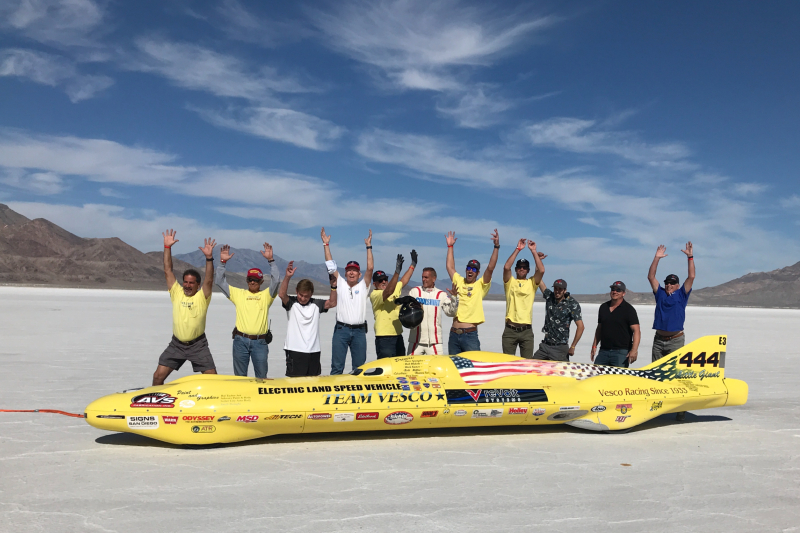
What’s the fastest you’ve ever driven? 100 mph? 120 mph? Now almost triple that and check out the live, driver’s eye view of what 353 mph looks like from driver Eric Vitter’s perspective as he ripped across salt flats in what’s essentially an electric rocket car. Kind of exhilarating and scary at the same time, right?
Earlier this month, Ritter piloted the Team Vesco-built streamliner Little Giant into the record books. Built by team owner Rick Vesco and Eddy Borysewicz, with significant contributions from American Track Roadster’s Greg Peek and engineer Trenton Wonsley, the Tesla Model-S modified twin motor streamliner crushed the previous 314 mph EV record. Motoring across Utah’s barren Bonneville Salt Flats, the team provided another example in a growing body of evidence showing that speed and power are not the sole domain of petroleum-powered engines.
“Borysewicz learned about not being afraid to do something that has never been done when he loaded in 1,152 prismatic lithium ion batteries and heavily modified (a) pair of Tesla motors,” a news release noted.
We live in a day and age where electric vehicles are gaining ground and market share on gas-guzzling engines. Environmental consciousness in concert with quality cars have green bills flowing in and new, massive investment from GM, Ford, Volkswagen, BMW, Porsche, and other car companies follow Tesla’s carving out of the EV niche. This consumer EV acceptance is now making its way to true gearheads.
“It reminds me of the early days of 1930s and 1940s with piston head engines,” Vesco said in a phone conversation.
Related Guides
Revolt Systems, inspired by the 1965 Ford Mustang, has helped to pave the way for crate motors, like its Model S-based kit, to bring unprecedented power to classic cars without losing vintage character. This work led the Portland, Oregon-based company to successfully engineer a twin motor setup for Team Vesco at Bonneville.
“We actually worked with Eddie B’s dad on electric bikes. That’s where that connection came from,” Vesco said.
Rick Vesco grew up watching his father Don fly rocket streamliners across the white, salten earth. At the Bonneville Nationals Inc. World Finals time trials on Oct. 18, 2001, the elder Vesco set a land speed record of 458 mph for wheel-driven cars in “The Turbinator,” a stock, 3,750 horsepower at 16,000 rpm internal combustion engine. Prior to the event, Don had set three consecutive national records in excess of 400 mph. Now, just two decades later, son Rick is embracing the electric revolution.
“We are excited about the future of electric vehicles and happy to be a part of shattering the notion that electric cars are slow,” Vesco said after the Vesco 444 reVolt Systems streamliner set the EV speed record.
While its records are not yet equal to combustible engine-driven rock cars, Revolt’s highly-modified Model S motors crank out approximately 533 horsepower and more than 800 pound-feet of torque that comes on instantly, as opposed to a gas motor that needs to rev up. With the 350-mph barrier broken, the team aims for 400 mph next.
“What an incredible ride,” driver Ritter said. “The torque off the starting line — it’s a monster. It bolts without hesitation and keeps pulling, non-stop. With the 357 mph top speed, 400 is now a reality (and) no longer just a dream.”
Commercial airplanes cruise at about 547–575 mph. Imagine piloting that jet on land. And make sure that you’ve got a good three miles to stop.
Read More: Lamborghini Revives the Countach in an Electrified Hypercar



